Artificial intelligence is quietly infiltrating every corner of our lives, from Conversational AI that powers virtual assistants to the Generative AI trends that are redefining pharma, manufacturing, and retail operations. In 2026, this technology is a driving force behind business strategy, innovation, and consumer experience.
This article explores the most compelling artificial intelligence statistics, offering a snapshot of its expanding influence in rewriting our possibilities, improving efficiencies, and inspiring new approaches. Let’s take a closer look at the numbers that reveal how AI is transforming our world in unexpected ways.
Table of Contents
10 Key Statistics You Need to Know
- 65% of consumers trust companies that use artificial intelligence to enhance their services.
- 53% of surveyed users independently verify LLM-generated content.
- 72% of executives see this technology as the most significant business advantage, underlining its strategic value.
- 66% of U.S. adults use smart tools regularly, illustrating the widespread integration of AI into daily activities.
- 79% of clients believe brands should disclose when it is used, emphasizing the demand for transparency.
- 55% of employees report saving 2 to 3 hours per week through solutions that automate tasks like scheduling and documentation.
- 84% of organizations employing AI for fraud detection have seen a measurable reduction in related losses.
- 30% of businesses have adopted this tech for customer service, with 56% planning to do so in the near future.
- 53% of C-suite leaders incorporate GenAI in their work, with the most common applications being marketing, product development, and client care.
- 75% of adopters in retail are using the tech for sales forecasting and improving customer engagement.
Global AI Market Statistics
AI Market Value
Currently valued at nearly 100 billion U.S. dollars, the global AI tools and services industry is in the midst of an astonishing boom. However, the real eye-opener is the projected growth. Experts anticipate a twentyfold increase by 2030, propelling it to nearly two trillion U.S. dollars.
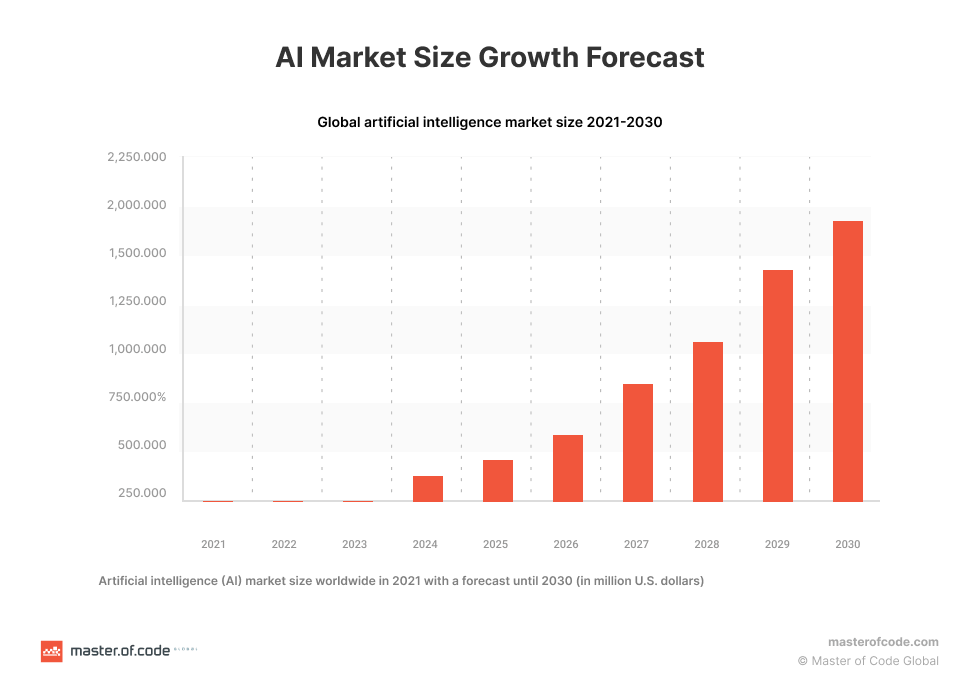
- In 2022, the AI market size worldwide surged to an impressive $136.6 billion. It’s a substantial leap from the $93.5 billion recorded in 2021.
- Currently, intelligent software globally earns over $50 billion in annual revenue.
- Predictions are nothing short of astounding, with the global market expected to reach an astonishing $1,811.8 billion by 2030. This means that technology will continue to fuel a digital revolution, and by 2026, it is poised to be valued at nearly $4 trillion.
The global AI market is not merely expanding; it’s soaring to unprecedented heights. The pace of its growth is remarkable, with a CAGR of 38.1% during the forecast period.
Revenue Projections
- According to Grand View Research, the market size was estimated at USD 279.22 billion in 2024 and is projected to reach USD 3,497.26 billion (≈ USD 3.5 trillion) by 2033, with a CAGR of ~31.5% from 2026–2033.
- In the software segment specifically, ABI Research reports the market was valued at USD 122 billion, anticipated to grow at ~25% CAGR to USD 467 billion by 2030.
Industry Valuation
In Q1 2026, AI-labelled startups raised US $73.1 billion globally, accounting for 57.9% of all venture capital funding in that quarter. This number is greatly influenced by the AI readiness index.
| Region | Total Funding | Number of Deals | Average Deal Size | YoY Growth | Market Share |
|---|---|---|---|---|---|
| North America | $52.3 B | 1,847 | $28.3 M | +34% | 58.5% |
| Europe | $18.7 B | 1,203 | $15.5 M | +41% | 20.9% |
| Asia-Pacific | $14.2 B | 967 | $14.7 M | +28% | 15.9% |
| China | $3.1 B | 234 | $13.2 M | –23% | 3.5% |
By sector, GenAI & LLMs led funding with $23.4 billion across 234 companies. That is averaging $890 million per valuation and growing +167% year-over-year. Autonomous vehicles and healthcare algorithms followed, attracting $14.7 billion and $12.1 billion, respectively.
GenAI startups command the highest valuation multiples, trading at 45× revenue and 67× ARR. It’s about 340% above traditional tech firms.
Economic Impact
- McKinsey & Company estimates that for 63 Generative AI use cases across business functions, the value could be USD 2.6–4.4 trillion annually.
- McKinsey further suggests embedding GenAI into broader software could push overall value up to about USD 6.1–7.9 trillion annually.
- PwC projects artificial intelligence could contribute up to USD 15.7 trillion to global GDP by 2030. This represents approximately a 14% increase versus a no-AI scenario.
- The greatest economic gains are expected in China, with GDP potentially rising by up to 26% by 2030. In North America, the boost could reach around 14%.
- The biggest sector-level benefits are likely to appear in retail, financial services, and healthcare. Technology will drive the improvements by increasing productivity, improving product quality, and stimulating consumption.
Unprecedented Investment
- According to the Stanford HAI “AI Index Report”, global private AI investment (corporate) reached USD 252.3 billion in 2024, with GeAI receiving USD 33.9 billion.
- The U.S. accounted for USD 109.1 billion, vastly higher than China (USD 9.3 billion) and the UK (USD 4.5 billion).
- The AI Index Report also shows private financing in GenAI achieved $33.9 billion in 2024 — an 18.7% increase from 2023 and more than 8.5 times higher than in 2022. The sector now accounts for over 20% of all funding in artificial intelligence.
Leading Regions
- North America maintained the largest share, accounting for 36.3% of total revenue. The European sector is experiencing steady expansion, driven by government initiatives and supportive policies encouraging the adoption of AI solutions. Meanwhile, the Asia-Pacific region stands out as the fastest-growing one.
- In the software market specifically, ABI Research reports that North America remains the dominant player. Asia-Pacific is expected to experience the most rapid artificial intelligence growth through 2030, with China projected to generate nearly two-thirds of APAC’s software revenue.
AI Software Market Statistics
- The global platform market size was estimated at about USD 26.65 billion in 2026 and is forecasted to grow to approximately USD 88.19 billion by 2034, at a CAGR of 14.22% from 2026 to 2034.
- North America leads with a 42% share, driven by infrastructure and major tech companies.
- Cloud-based deployment dominates with a 66% portion. Machine learning platforms capture the largest technology segment share (38%).
AI Hardware and Chip Market Statistics
- Global Market Insights valued the worldwide artificial intelligence domain at USD 59.3 billion. It is projected to expand from USD 66.8 billion in 2026 to USD 296.3 billion by 2034, representing an 18% CAGR.
- GPUs made up about 39% of overall revenue in 2024. North America, led by the United States, generated around USD 19.8 billion, or 91% of the region’s total income.
Wearable AI Market Growth
- This segment is worth USD 38.85 billion, according to Fortune Business Insights. It is expected to increase more than sixfold to USD 260.29 billion by 2032, driven by advances in smart devices and edge processing.
- North America represented about 35.9%, maintaining its lead through innovations in consumer tech and healthcare devices.
Trust in Artificial Intelligence Statistics
AI is steadily earning confidence across different sectors. Here’s a look at who believes in technology and why it matters:
- Around 65% of people are comfortable with brands using AI to enhance their services, showing widespread acceptance for customer interactions.
- Nevertheless, trust in LLM-generated data is more cautious, with just 14.03% of individuals feeling confident in its accuracy.
- Approximately 32.5% of users rely on LLM-powered search results, signaling a gradual shift toward reliance on models for accurate information.
- Among executives, 84% view it as essential for growth, underscoring its strategic value in the corporate world.
- While 52% of adults trust businesses that use this technology, only 39% feel firms are transparent about their usage. However, openness boosts enthusiasm, with the figure rising to 54% when organizations are open about their intelligent practices.
In conclusion, AI is gaining credibility, but consumers still seek clarity on its application. Therefore, transparency is crucial for companies to maintain trust in their initiatives and offerings, including their AI development services.
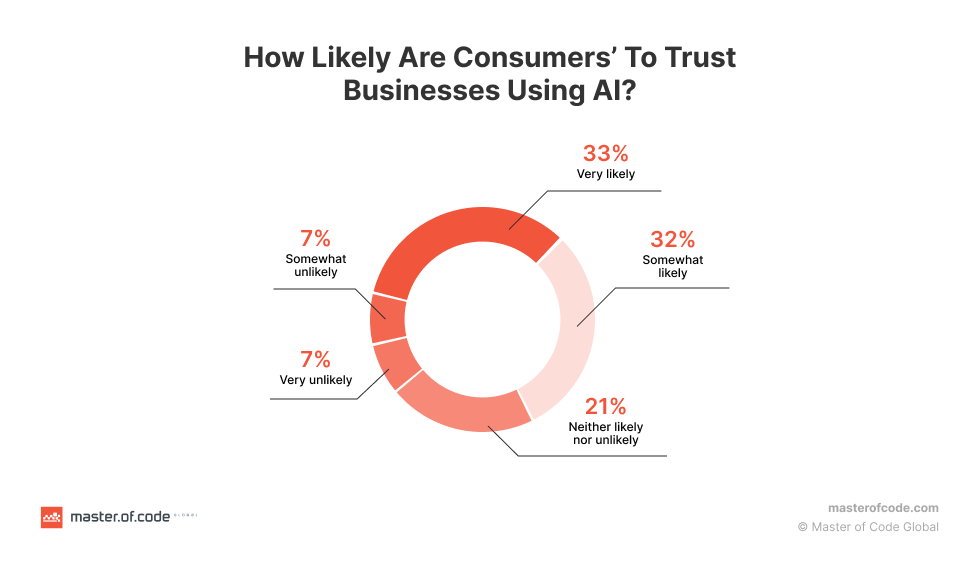
Artificial Intelligence Growth Statistics
- Generative AI’s Soaring Popularity: More than 100 million people in the U.S. are expected to use it by 2024, and that number is set to climb to 116.9 million by 2026. In fact, over half of all Americans aged 12 to 44 are predicted to use new technology by 2026.
- Investment Surge: GenAI is a hot topic among executives, with 96% discussing it with their boards. Moreover, the popularity of ChatGPT has led to a 45% increase in intelligentization investment, according to 45% of leaders.
- Mixed Feelings on AI Speed: While technology is growing rapidly, 46% of U.S. adults express concerns that advanced systems are being developed too quickly.
- AI Changing Lives: 66% of global adults believe that smart products and services will significantly change their lives in the next three to five years.
Year-over-Year Adoption Growth
2021: Around 56% of organizations reported using AI in at least one business function.
2021: About 31% of IT professionals said their company had deployed intelligent technologies.
2022: Roughly 35% of businesses embraced technology, marking a 4-point increase over 2021.
2023: About 55% of institutions employed artificial intelligence in their operations.
2024: Adoption surged to 78% of organizations worldwide.
2025: Approximately 78% of companies report active use.
Usage of Artificial Intelligence Statistics
As artificial intelligence continues its remarkable growth, it’s not just about the numbers; it’s about how it is being put to work in practice:
- AI Business Usage: In 2017, 20% of respondents reported adopting tech in at least one area, while in 2022, that figure stood at 50%. An additional 42% are exploring AI for their operations. Larger companies are 100% more likely to use it than smaller ones, but 41% of smaller brands are currently developing intelligent strategies.
- AI at Work: Among U.S. adults, 28% report that their employers use ChatGPT or similar chat-based tools. 19% mention image generators, 30% cite it for data analysis, 21% use tools for video creation, and 17% employ AI for HR and recruiting. In response to its growth, 35% of organizations are training and reskilling their teams to use new automation tools.
- Generative AI Adoption: Surprisingly, 22% of respondents in a McKinsey survey regularly use it in their work, while 79% have had at least some exposure to it. A significant 48% of IT leaders mentioned their organizations are using it beyond ChatGPT. The biggest users of the new technology are aged 25 to 34, making up 21.4% of all users, followed by 35 to 44-year-olds (19.3%) and 18 to 24-year-olds (14.0%).
- AI Understanding: While 67% of adults say they have a good understanding of what tech is, only 51% can identify which products and services use such a component.
Artificial intelligence is a reality that’s transforming the way we live and work. These growth and usage facts paint a vivid picture of its rapid evolution and its impact on our world.
Global AI Adoption Statistics
In recent years, businesses and organizations have increasingly recognized the potential of this technology to enhance operations, improve customer experiences, and drive innovation.
- Approximately 55% of Americans engage with artificial intelligence either on a constant basis or at least once a day.
- 44% of organizations are working to embed AI into current applications and processes, with two-thirds already using or planning to apply it.
- 25% of companies are adopting this tech due to labor shortages, as it helps optimize operations and compensate for a lack of human resources.
- For 4 in 5 brands, artificial intelligence is a top priority in their business strategy.
- Almost 100 million people are expected to be working in the AI space by 2026.
- The most common areas for implementation include ‘service operations’ and ‘strategy & corporate finance.’
- On average, firms that have adopted artificial intelligence use 3.8 different capabilities.
- An important factor driving adoption is easier accessibility (43%), followed by cost-cutting and process automation (42%).
- 54% of customers had daily AI interactions with organizations, using technologies like chatbots, digital assistants, and biometric scanners.
- According to AI in eCommerce statistics, technology is expected to handle 80% of all customer interactions by 2023 (ZipDo).
- The main barrier for enterprises not adopting machine intelligence is a lack of expertise in how it works (34%).
- The number of tech startups since 2000 has grown 14 times.
- Global businesses’ impressions of AI are increasingly positive. 72% of executives believe that it will be the most significant advantage of the future.
- In 2022, an Accenture report highlighted that companies employing GenAI for product design, development, and production saved 30 times more than their counterparts.
- According to an IBM survey, cost savings and efficiencies were identified as the top benefits of its adoption by 54% of brands, followed by improvements in IT or network performance at 53%, and enhanced customer experiences at 48%.
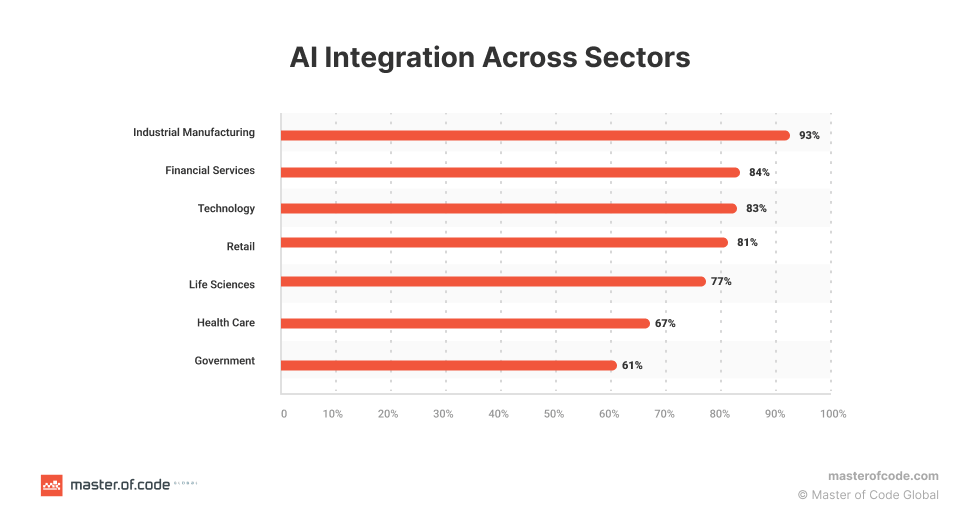
Enterprise Adoption Rates
- A 2025 overview shows 87% of large enterprises have already implemented cognitive solutions. Top use cases include process automation (76%), chatbots (71%), and data analytics (68%), driving faster decisions and workflow efficiency.
- Organizations report clear payoffs: up to 84% better fraud detection, 29% less downtime, and 56% higher conversion rates through AI-enabled optimization.
- In the EU in 2024, for enterprises using at least one AI tech: 34.08% used it for marketing/sales, and 27.51% for business administration/management.
Daily Use by Consumers
- According to recent data, 43% of people employ self-learning tools daily.
- Another source indicates that 66% of people globally utilize artificial intelligence on a regular basis, and 500–600 million engage with it daily.
- Among U.S. adults, ~19% rely on AI each day, while approximately 61% have used it in the past six months.
Adoption by Device / Platform
- App Usage: ChatGPT leads the global intelligent mobile app market with 557 million monthly active users (MAUs) across iOS and Android. It’s over eight times more than Google Gemini’s 70 million. Deepseek follows with ~60 million MAUs, while Perplexity (39.4 million) and X’s Grok (38.9 million) complete the top five.
- Web Platform Adoption: ChatGPT again dominates with 489 million unique web visitors (August 2025), ahead of Google Gemini (122 million) and Deepseek (45.2 million). Grok (26.3 million) and Perplexity (24.8 million) round out the top performers, confirming these five as the world’s most-visited platforms.
Artificial Intelligence Adoption by Industries
AI in Retail
- The global market in retail is projected to reach $31.18 billion by 2028.
- In 2021, 73% of retailers planned to implement it for pricing optimization.
- 75% of companies have intentions to leverage AI to combat fraud.
- Amazon achieved a 225% decrease in “click to ship” time by utilizing machine learning (ML), reducing it to 15 minutes.
- 87% of adopters in retail are either using or considering artificial intelligence for sales forecasting and email marketing improvement.
- 80% of executives anticipate automation adoption in their businesses by 2026.
- The sector leads in AI implementation, with 72% of retailers actively using technology.
- 52% of telecommunications organizations employ chatbots to enhance productivity.
- The market is valued at $2.5 billion and is on the rise.
- 63% of IT and telecom sector brands incorporate artificial intelligence.
- Generative AI in Telecom is expected to surge from $1.6 billion in 2022 to an estimated $2.9 billion by 2026.
- This market experienced a growth rate of 38.6% from 2026 to 2030.
- Approximately 1 in 3 medical professionals now employ computer systems for diagnosis assistance.
- 19% of healthcare organizations are already implementing technology, with an additional 18% in the adoption process.
- A survey by KPMG found that 62% of U.S. companies’ finance functions were using AI to a moderate or large degree in 2024.
- As per another study, 71% of businesses surveyed globally reported adopting it within their finance operations.
- According to the report from Master of Code Global and Infobip, financial organizations most often deploy RPA and chatbots (89%), followed by fraud detection (78%), agent assist tools (75%), and credit scoring (56%).
- The main motivators are competitive advantage (56%) and risk mitigation (44%), with added focus on customer experience (33%) and revenue growth (32%).
AI in Manufacturing
- The industrial market reached USD 43.6 billion and is forecast to grow to USD 153.9 billion by 2030 (CAGR ~23%).
- Nearly 98% of large manufacturers expect AI to become essential within the next three to five years.
- Around 60% are already shifting from reactive to predictive maintenance, and among adopters, 88% report fewer breakdowns and better asset visibility.
- Companies using self-learning systems see an average 30% reduction in maintenance costs, 10–20% higher machine uptime, and 70% fewer equipment breakdowns.
- Additional gains include 5–20% higher labor productivity, 10–30% lower inventory, and up to 20–50% faster planning.
AI in Business Statistics
How Businesses Use Artificial Intelligence
- 77% of high-adoption organizations report using coding assistants, 65% employ content generation instruments, and 57% adopt documentation-search apps.
- Among small businesses, 37% use AI tools for sales functions and 45% for marketing on a weekly basis.
- A SurveyMonkey study shows that 51% of marketing organizations incorporate technology to optimize content (email, SEO, etc.), 50% create content with it, and 43% automate repetitive tasks/processes.
ROI Statistics
- According to IDC, businesses leveraging GenAI see an average ROI of USD 3.7 for every dollar spent, with some achieving up to USD 10.3 for every dollar.
- In a Google Cloud study, 74% of executives reported attaining ROI within the first year of deploying agents, and 39% saw productivity at least double.
- But on the flip side, IBM found that only 25% of intelligentization initiatives delivered expected returns, and only 16% have scaled enterprise-wide.
AI Impact on Corporate Productivity
- Workers using GenAI tools can boost their performance by up to 40% compared with peers who do not use them.
- Embedding models into enterprise systems can lead to 20–60% increases in productivity, including a 30% improvement in credit turnaround time in financial services.
AI Competitive Advantage Statistics
- 90% of businesses view AI agents as a strategic edge. Companies deploying them witness 55% higher operational efficiency and a 35% cost reduction.
- Those with a clearly defined strategy are twice as likely to report higher AI-based income, and 3.5 times more likely to realize critical benefits compared with firms without one.
AI-Driven Revenue Growth
- About 44% of surveyed companies reported profit increases linked to artificial intelligence adoption.
- Among sales teams using advanced tools, 83% saw stronger performance over the past year, compared with 66% of teams without those.
- AI investments accounted for roughly 35% of total productivity-driven gains, alongside improvements in cost efficiency and innovation.
AI Function Statistics in Business
In the realm of business functions, this technology has proven to be a transformative force, particularly in marketing, customer service, and sales. These sectors are increasingly relying on machine learning to drive efficiency, enhance customer experiences, and boost revenues.
AI in Customer Service Stats
- Data reveals how companies use AI to enhance the customer experience, including chatbots (73%), email composition (61%), product recommendations (55%), and personalized advertising (46%).
- 75% of consumers are comfortable with chatbots handling routine customer service tasks. Yet, only 33% approve of chatbots managing complex inquiries.
- 56% of businesses already use or plan to use AI for customer service. Other top uses include cybersecurity, fraud management (51%), digital personal assistants (47%), and customer relationship management (46%).
- Over 60% of business owners, specifically 64%, are optimistic that artificial intelligence will enhance customer relationships.
- 67% of people expect to use messaging apps to communicate with businesses.
AI in Marketing Stats
- Marketers are rapidly adopting artificial intelligence, with 75.7% using smart tools for work.
- 60% of marketers are positive about the rise of the AI industry. And 59% believe that technology will bring about a revolution in the marketing industry.
- Marketing and sales departments show a 40% higher prioritization of ML for revenue success compared to other departments. Around 4 in 10 marketers believe that automated email marketing improves market revenue.
- AI-driven marketing could increase productivity by up to 35% and deliver cost savings of up to 30% (Market Splash).
- According to Generative AI statistics, it is used by 69% of digital marketers, particularly for blog content creation.
- 43% of American marketers reported that chatbots were effective in educating prospects, and 57% of B2B marketers used chatbots to understand their audience better.
- While 67.7% of marketers acknowledge the benefits of technology, lack of knowledge and time are barriers to adoption.
- 37.4% of digital marketers are using AI detection tools.
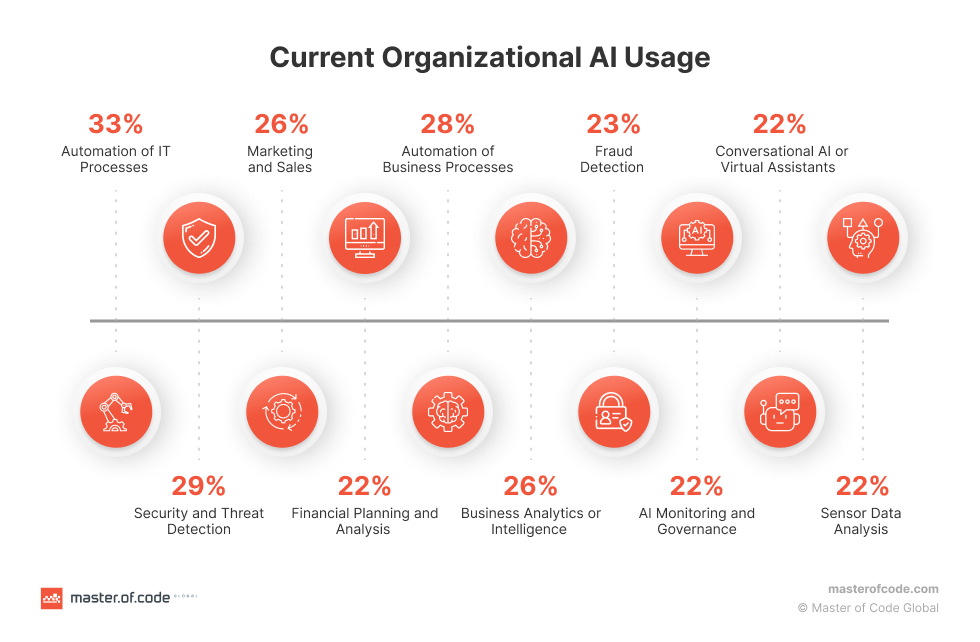
AI in Sales Stats
- Intelligent algorithms reveal data on which products generate the highest profit margins and offer valuable insight into a client’s purchasing habits.
- Recent data shows that using AI for sales increases leads by 50%, reduces call times by 60%, and results in overall cost reductions of up to 60%.
- Artificial intelligence is used in various business functions, including product and service development (55%), marketing and sales (55%), and service operations (54%).
- 41.29% of marketers agree that using AI for email marketing generates higher market revenue.
Artificial intelligence is revolutionizing customer service, marketing, and sales functions in distinct ways. As technology continues to evolve, these sectors will likely see further innovations and improvements in their respective processes and outcomes.
AI Consumer Interaction Statistics
Accuracy Perception
- Over 53% of surveyed users say they independently verify AI-generated content — for example, by cross-checking trusted sources or reviewing citations. Despite the growing use of GenAI, about 74% feel it has made online information harder to trust.
- At the same time, 79% of consumers believe companies should clearly disclose when technology is involved, showing a strong demand for transparency and a responsible AI ecosystem.
- KPMG reports that 55% of respondents feel confident assessing the accuracy of LLM outputs to a moderate or large extent, while nearly 47% say they rarely or never encounter incorrect or misleading algorithm-generated data.
Errors and Consumer Confidence
- A survey by Insurity shows declining trust in artificial intelligence; only 26% of Millennials expressed a positive view in 2026, down from 41% the previous year.
- Deloitte notes that one in three users has encountered inaccurate or deceptive results from generative tools, while 24% raised concerns about privacy.
AI Statistics: Employment and Workforce
The Upside of Artificial Intelligence
- Labor Demand and Increased Productivity: AI is expected to create an additional labor demand of 21% to 33% in the global workforce by 2030. By 2035, such technologies may increase labor productivity by up to 40% across various industries, adding $3.8 trillion GVA to manufacturing.
- New Job Creation: Despite concerns, artificial intelligence is projected to create approximately 97 million new jobs, countering workforce displacement worries. Roles like software engineers and data engineers are in high demand for AI-related positions.
- Enhanced Job Satisfaction: Deloitte’s survey shows that 82% of business leaders believe AI enhances job satisfaction and performance.
Artificial Intelligence’s Threat to Jobs
- Job Displacement: McKinsey predicts that nearly 400 million workers (15% of the global workforce) may be displaced by AI by 2030. Six out of ten current occupations have over 30% of automatable activities.
- Job Concerns: A substantial 77% of people express concerns about this technology causing job losses. Its adoption may replace 16% of all U.S. jobs in less than five years, with a net job loss of 7%. Around 375 million people may need to switch careers by 2030.
- Challenges in Education: The current educational structures are unprepared for the employment effects of AI in 2030 and beyond.
- Job Vulnerabilities: According to the Pew Research Center, certain professions are particularly vulnerable to automation. These include office and administrative support (46%), legal work (44%), and architecture and engineering (37%).
- Mixed Views on Impact: While 82% of business leaders see AI enhancing job satisfaction, 47% believe it creates fear or concern. Different age groups have varying perspectives on its impact on job creation.
Job Creation and Displacement
- By 2026, AI is projected to create approximately 170 million new jobs globally, leading to a net gain of 78 million jobs after accounting for losses. In India, it is expected to generate up to 4 million vacancies by 2030, particularly in technology and customer experience sectors.
- The World Economic Forum estimates that 92 million jobs could be displaced by AI by 2030. In the first half of 2026 alone, 76,440 positions were eliminated, with manufacturing and administrative roles being most affected.
- Industries most exposed to artificial intelligence, such as software publishing, have experienced up to 3x higher growth in revenue per employee compared to less exposed sectors like logging.
High-Demand Skills and Emerging Roles
According to edX, in 2024, nearly 628,000 job postings required at least one AI skill. This represents 1.7% of all openings, up from 0.5% in 2010 — a 240% increase over 14 years, with rapid acceleration in recent years.
From 2023 to 2024, vacancies requiring AI skills jumped 73%, and surged another 109% from 2024 to 2026. In the most recent 30-day period in 2026, there were over 120,000 jobs requiring such skills, more than doubling (+104%) year-over-year.
The top competencies were:
- Artificial intelligence (general): 120,682 postings (+104% YoY)
- Machine learning: 63,909 (+30% YoY)
- Deep learning: 8,132 (+6% YoY)
- Large language modeling: 7,563 (+98% YoY)
- AI translation: 7,138 (new)
- Computer vision: 4,733 (+25% YoY)
- Prompt engineering: 3,778 (+227% YoY)
- ChatGPT-specific skills: 3,401 (+260% YoY)
- AI agents: 3,028 (+899% YoY)
Artificial intelligence skill demand is highest in computer and mathematical occupations, reaching 12.3% of positions in this sector, compared to under 3.2% in other major occupational groups.
Fastest growing roles based on demand and growth rates include:
- AI engineer — 143.2%
- Prompt engineer — 135.8%
- Ethics officers and responsible AI specialists
Emerging niche roles such as NLP scientist and human-AI interaction designer are becoming increasingly common.
Shift in Tasks
- Automation and Employee Preferences: A Gartner survey found that 70% of U.S. workers are open to AI handling certain tasks. Specifically, 36% favor it for data processing, 32% for automating digital tasks, and 28% for information discovery.
- Impact on Job Roles: According to the International Monetary Fund, its adoption is expected to affect 40% of workers globally, either fully or partially replacing their jobs.
Jobs Most at Risk of Automation
According to the research by Microsoft, jobs with the highest risk scores (0.45+ on a scale measuring task applicability) include:
- Interpreters and translators
- Historians
- Passenger attendants
- Sales representatives of services
- Writers and authors
With very high risk jobs (0.40–0.44 score):
- Customer service representatives
- CNC tool programmers
- Telephone operators
- Ticket agents and travel clerks
- Broadcast announcers and radio DJs
- Brokerage clerks
- Farm and home management educators
- Telemarketers
- Concierges
In summary, AI has the potential to significantly impact the global workforce, both positively and negatively. It can create new opportunities and enhance productivity, but it also poses challenges related to job displacement and the need for workforce adaptation. Adaptation through education and innovation is crucial to mitigate these challenges.
Performance & AI Efficiency Statistics
- Productivity Gains: Companies leveraging AI report approximately a 27% boost in effectiveness from 2018 to 2024. Specifically, industries like finance and software see a 4x increase in productivity growth.
- Time Savings: Employees save an average of 2 to 3 hours per week, primarily by automating repetitive tasks like documentation and scheduling. Among frequent Generative AI users, 20.5% observe saving four or more hours per week, with daily users experiencing even greater time savings.
- Accuracy Improvements: Artificial intelligence is significantly improving precision in business. Tools like Salesforce’s system achieve 93% accuracy in customer service. AI-powered fraud detection systems reach an 89.7% rate in eCommerce. In healthcare, algorithmic tools detect certain cancers with 94% precision, surpassing human benchmarks.
- Accuracy & AI Performance Metrics: Scores on challenging tests rose by 18.8 to 67.3 percentage points across standards like MMMU, GPQA, and SWE-bench. This demonstrates significant leaps in models’ capabilities for language understanding and coding. For example, Google’s Gemini 2.5 has 89.1% accuracy in summarization tasks and top scores (Elo 1458) in generation and technical assistance. Anthropic’s Claude closely follows with 79.4% and an Elo of 1357.
Statistics About Artificial Intelligence Technologies
Technologies like chatbots, voice assistants, and ML are making substantial impacts. They are reshaping how businesses operate, how we interact with machines, and even the job market.
Chatbots/Conversational AI
- The global market for AI technologies is projected to reach $32.62 billion by 2030.
- Around 50% of large companies are contemplating increased investments in chatbot technology.
- Nearly 80% of CEOs have already made or plan to make changes in how they utilize conversational technologies to manage client engagement (Accenture).
- 69% of survey participants prefer chatbots for receiving immediate responses. The same percentage would opt for chatbots for service-related inquiries.
- Remarkably, 80% of consumers who have interacted with chatbots report a positive customer experience.
Voice Assistants and Search
- About 36.6% of the United States population utilizes voice assistants.
- A substantial 66% of individuals who employ digital assistants use them on a weekly basis.
- An impressive 93% of users express satisfaction with their voice assistants.
- On average, voice assistants can successfully answer 93.7% of all search queries.
- A significant 72% of individuals report using voice search via their personal digital assistants.
- Approximately 68% of voice assistant users agree that personal assistants make their lives easier.
- Surprisingly, 71% of consumers prefer using voice searches as opposed to the traditional method of typing for queries.
- More than half of online shoppers in the United States employ voice assistants to aid in product research, and over a third use them to add items to their shopping lists.
Machine Learning
- 82% of companies seek employees with ML skills.
- 73% of business leaders believe machine learning can double employee productivity.
- The global machine learning industry is projected to grow at a 38.8% CAGR from 2022 to 2029.
- Top uses for ML are improving customer experience and process automation.
- 61% of marketers prioritize machine learning in their data strategies.
- AI and machine learning reduce sales call times by 60–70%.
- 74% of company leaders believe more investment in ML and automation can help achieve their goals.
Generative AI Statistics
- Enterprise implementation has steadily risen from 20% in 2017 to 78% in 2024, reflecting increasing confidence in intelligent technologies.
- The adoption of GenAI is accelerating even more rapidly: 33% of organizations embraced the technology in 2023, 65% reported using it by March 2024, and 71% had adopted it by July 2024.
- The 2026 Key Issues Study indicates that 89% of enterprises are actively progressing with their Generative AI initiatives.
- According to Bain, GAI is a top 3 priority for nearly 50% of executives and a top 5 concern for 28% due to its potential to disrupt industries. Major areas of impact include core product differentiation (56%), new customer engagement methods (52%), new business models (48%), and changes to cost structures (43%).
- McKinsey reports that 53% of C-suite leaders use GenAI regularly at work, compared to 44% of mid-level managers, with companies mainly applying it in marketing, product development, service operations, and software engineering.
As the information reveals, chatbots, AI voice assistants, GenAI, and ML are rapidly becoming integral parts of our lives and industries. Staying informed about the trends and developments in these technologies is vital as we move forward into an AI-driven future.
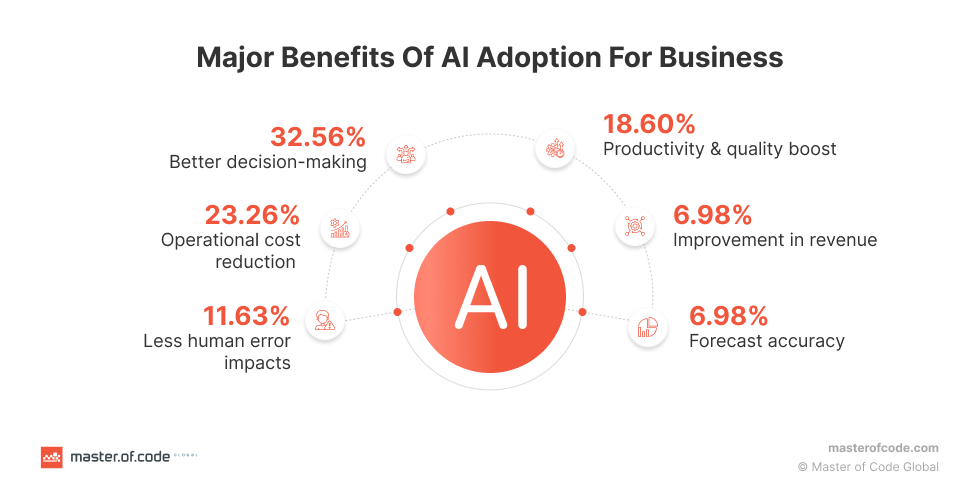
Emerging Trends and Challenges
- Growing Regulation: Globally, legislative mentions of AI increased by 21.3% across 75 countries since 2023. There has been a ninefold increase since 2016. Over 79% of nations have cybercrime laws in effect related to artificial intelligence, and over 90% have some form of AI governance framework in place.
- Addressing Bias: A research report by Findem shows that smart solutions deliver up to 39% fairer treatment for women and 45% for racial minority candidates compared to human decision-making in hiring. 85% of audited models meet industry fairness thresholds, demonstrating AI’s capability to reduce bias when responsibly designed.
- Transparency: The explainable AI market is projected to grow to $13.4 billion, driven by the rising need for accountability in such systems. Furthermore, 76% of executives consider transparency and explainability essential for building trust in technology.
- AI Cost and Accessibility Challenges: Total implementation scopes typically range from $200,000 to over $1 million depending on project complexity. Hidden costs such as data preparation, change management, and compliance add 30–50% to initial budgets. In fact, 54% of companies underestimate their expenses by 30–40%.
Societal Impact of Artificial Intelligence
AI and Human Behavior
- 50% of Americans are more concerned than excited about the increased use of AI in daily life, up from 37% in 2021. Concerns center on it affecting human abilities like creativity and relationships.
- Half of Americans believe technology will worsen people’s ability to form meaningful relationships, with only 5% thinking it will improve this skill.
- 73% of Americans oppose artificial intelligence advising on deeply personal matters like faith, and 66% reject its involvement in judging love compatibility.
Ethical and Cultural Implications
- 82% of Americans care about the ethics of AI, and 68% are concerned about its negative impact on humanity.
- 86% believe tech companies should be regulated, and 83% think the government should establish clearer regulations.
- 72% of global AI experts agree that cultural considerations should guide ethical development.
AI’s Role in Media, Education, and Public Life
- 89.9% of journalists believe artificial intelligence significantly increases the risk of disinformation, citing challenges like deepfakes and inaccurate data generation.
- 75% of Americans report decreased trust in online content, with 78% finding it harder to distinguish real from LLM-generated information.
- 45% of UK public sector workers are aware of GenAI usage in their roles, with 22% actively using it. Many report improved efficiency and reduced bureaucracy.
- 61% of public service professionals trust LLM outputs, though 76% feel the UK lacks clear guidelines for technology use in public services.
AI in Education Statistics
- 92% of UK university students now use instruments like ChatGPT, up from 66% in 2024. However, only 33% have received formal training.
- 40% of U.S. learners admit to using artificial intelligence on assignments without permission, while 65% of educators report detecting AI-related cheating.
- 86% of students globally use this technology in their studies, with 54% doing so weekly or daily.
AI in Science and Research Statistics
- 13% of global artificial intelligence research players are based in the EU, compared to 4% in the US and 1% in China.
- 94% of scientists believe AI will be either essential or very useful for their work in the next decade, primarily for tasks like data processing and computations.
- Intelligentization is expected to open new avenues, such as processing unstructured data (e.g., images), optimizing experimental setups, and generating new research hypotheses.
AI Model Benchmark Statistics
- Best in Reasoning (GPQA Diamond): GPT-5 leads with a score of 92.3%, followed by Claude 3.7 Sonnet at 92.1% (vellum.ai).
- Best in Coding: Kimi-K2 outperforms other models in coding benchmarks, offering competitive performance with advanced reasoning capabilities.
- Best in Biology: GPT-5 and Claude 3.7 Sonnet have demonstrated expert-level output on biology standards, surpassing human experts in certain areas.
Global AI Sentiment and Opinion Statistics
- Globally, 52% of people are excited about solutions powered by artificial intelligence, while 53% express nervousness.
- 53% of individuals report that AI products and services have changed their lives in the past 3–5 years, and 67% anticipate further changes in the next 3–5 years.
- 79% of people globally agree that companies using this technology should be required to disclose it.
- Only 31% of Americans trust their government to regulate GenAI deployments responsibly.
AI Statistics on Energy and Environmental Impact
Energy Use in Training and Data Centers
- Worldwide electricity usage is projected to double by 2030, reaching approximately 945 terawatt-hours (TWh). AI-specific data centers are expected to quadruple their energy demand during this period, representing around 3% of the total by 2030.
- Data centers accounted for 4% of total U.S. electricity use in 2024, with projections indicating that their needs will more than double by 2030.
- By 2028, major model training operations could consume 1–2 gigawatts (GW) of power, potentially escalating to 4–16 GW by 2030.
Carbon Footprint of Models
- By 2035, Generative AI’s global carbon emissions could range from 18.21 to 245.94 million metric tons annually, with energy consumption varying between 404.77 and 5,616.3 terawatt-hours depending on model size and usage patterns.
- GPT-3: Training this model consumed approximately 1,287 MWh of electricity, resulting in about 502 metric tons of CO₂ emissions — equivalent to the annual footprint of 112 gasoline cars.
- BLOOM: Prepared on a French supercomputer primarily powered by nuclear energy, BLOOM used 433 MWh and emitted 25 metric tons of CO₂.
- Llama 3.1: Produced an estimated 8,930 metric tons of CO₂ emissions, highlighting the escalating environmental impact of increasingly complex models.
Sustainability and Green Initiatives
- Coalition for Sustainable AI: Launched at the AI Action Summit in Paris in February 2026, this coalition includes UNEP, France, and the International Telecommunication Union. Its mission is to align AI development with environmental considerations, promote sustainability through standardized measures, and encourage the creation of more efficient hardware and software.
- AI Energy Score Initiative: Co-led by Hugging Face and Salesforce, this project aims to establish a standardized framework for evaluating the energy efficiency of AI models. It includes a public leaderboard to track progress and encourages the design of low-power solutions.
AI Safety and Governance Statistics
Responsible AI Adoption in Finance
- Despite the rapid adoption, only 36% of organizations have integrated responsible practices, such as defined key risk indicators and data quality guidelines.
- 99% of businesses reported financial losses due to AI-related risks, with 64% experiencing losses exceeding $1 million.
- Companies with robust governance programs achieved valuations and revenues up to 4% higher than those focusing solely on compliance.
Security-First AI Strategies
- Around 55% of businesses have adopted AI-driven cybersecurity measures as part of their defenses.
- 69% use artificial intelligence for threat detection and prevention.
- In the industrial/OT sector, 62% of companies are using or planning to implement AI in cybersecurity, and 64% find it especially effective for detecting hazards.
- In surveys, 75% of respondents trust AI-based tools for identifying and blocking threats, compared to just 50% confidence in traditional methods.
Collaboration on AI Standards
- A new AI Standards Exchange database (launched by the International Telecommunication Union, International Organization for Standardization, and International Electrotechnical Commission) helps standards bodies coordinate work across industry, policy, and tech domains.
- The ISO/IEC technical committee for AI currently has 39 published standards and comprises over 20 participating country members.
- The OECD AI Principles are recognized by 70+ jurisdictions that report over 1,000 national AI-policy initiatives aligned with those principles.
- At the global level, multilateral efforts like the G7’s “Hiroshima AI Process” now involve 49 governments working on coordination of AI governance and standards.
Trusted and Ethical Systems
- 65% of consumers say they trust businesses that use intelligent technology — indicating that trust depends heavily on ethical practices and transparency.
- Only 34% of respondents believe intelligent solutions sufficiently uphold ethical principles and human rights.
- In a survey of 48,340 workers in 47 countries, 58% intentionally apply AI at work. However, 66% say they do not check LLM outputs for accuracy, and 57% admit hiding usage from employers.
- An industry study found that 95% of executives reported experiencing an AI mishap in their organization, while only 2% of firms currently meet responsible-use standards.
Future of AI Statistics
The future of artificial intelligence promises groundbreaking advancements that will reshape industries and transform the way we interact with technology.
- By 2027, AI tech debt will be reduced by 70% through simulation platforms.
- Organizations without advanced model observability capability by 2026 will experience a 20% decrease in models running in production.
- Investment in AI startups relying on foundation models will surpass $10 billion through 2026.
- By 2026, 30% of new applications will feature personalized adaptive user interfaces driven by artificial intelligence.
- Analytics tools will be the primary source of insight for 40% of digital product enhancements by 2026, up from 10%.
- Over 35% of software will use AI-based digital twins for UX development by 2027, up from less than 5%.
- By 2027, nearly 15% of new applications will be automatically generated by smart algorithms without human involvement.
The future of artificial intelligence is filled with immense potential and innovation. From reducing technical debt to automating application generation, these numbers highlight the transformative impact AI trends will have on various sectors. As businesses and organizations adapt to this evolving landscape, harnessing the power of this technology will be essential for staying competitive and driving progress in the coming years.






